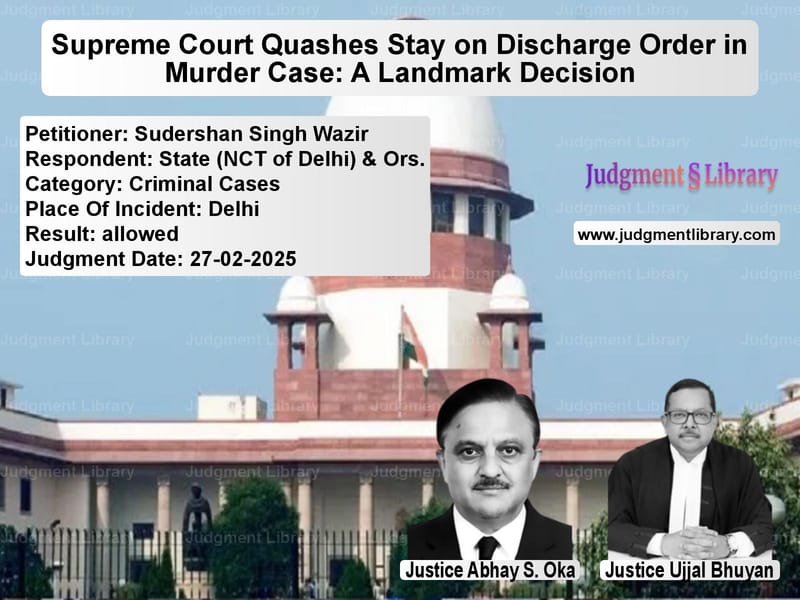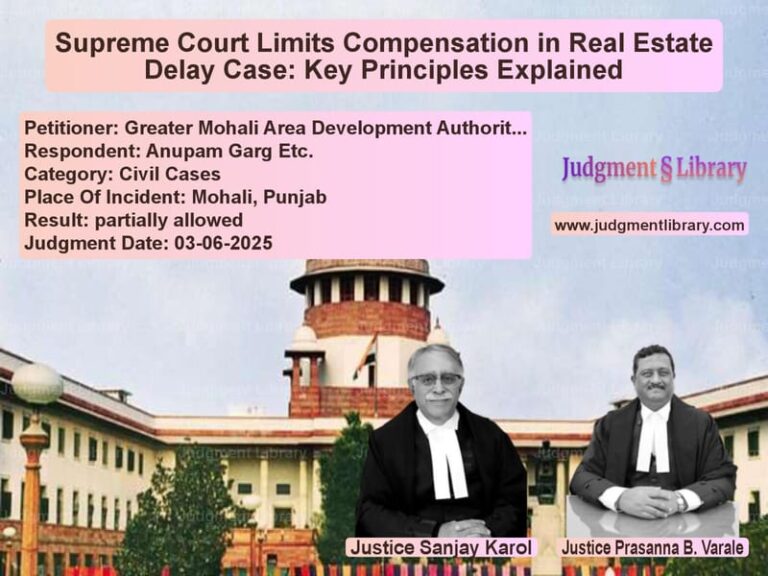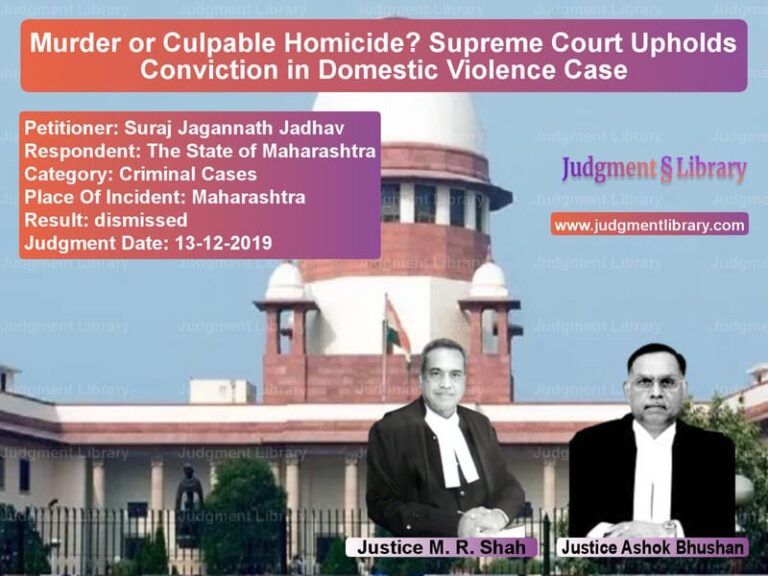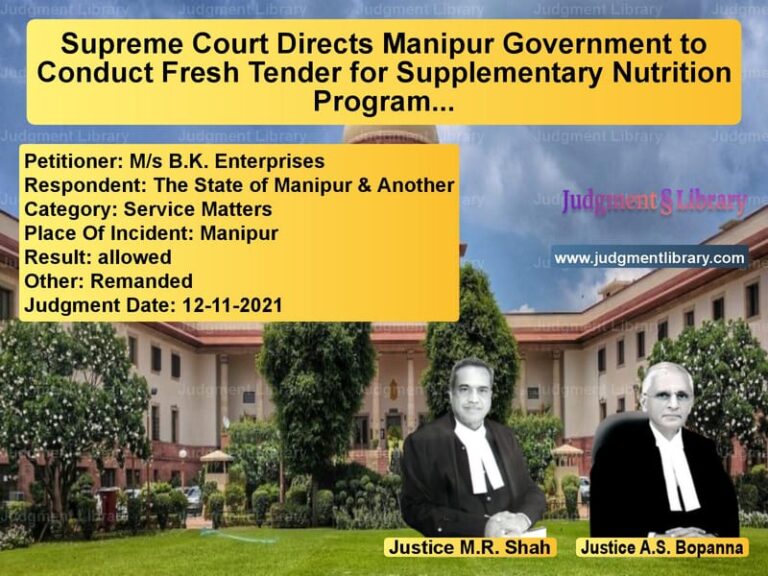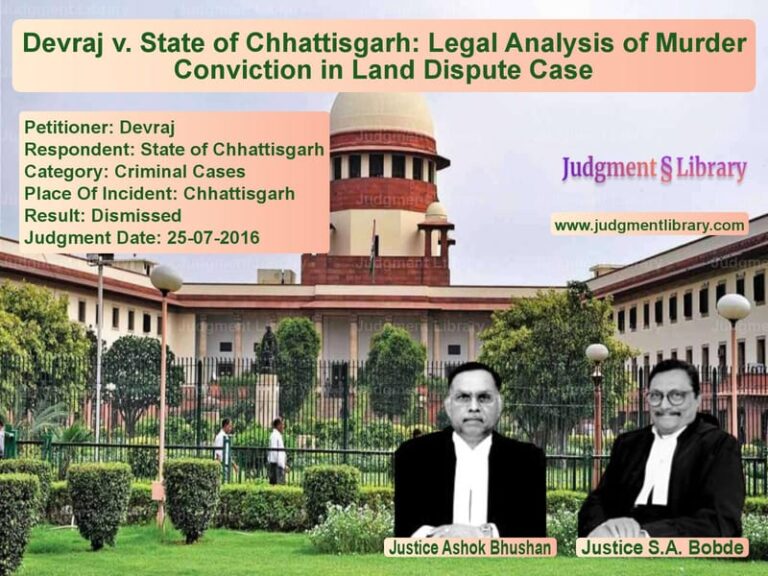Supreme Court Quashes Stay on Discharge Order in Murder Case: A Landmark Decision
The case of Sudershan Singh Wazir v. State (NCT of Delhi) & Ors. revolved around a legal dispute concerning the discharge of an accused in a high-profile murder case. The appellant, who was not originally named in the First Information Report (FIR), was later arraigned as an accused in the third supplementary chargesheet under Sections 302, 201, and 34 of the Indian Penal Code (IPC), along with Sections 25 and 27 of the Arms Act.
The Additional Sessions Judge discharged the appellant from all charges on October 20, 2023, leading to his immediate release on bond. However, the High Court of Delhi later stayed this discharge order, effectively revoking his release. The appellant then moved the Supreme Court to challenge the High Court’s decision.
Background of the Case
The case was initiated following the murder of a former Member of the Legislative Council of Jammu and Kashmir, who was also the Chairman of the Jammu and Kashmir Gurudwara Prabandhak Committee. The prosecution contended that strong evidence, including CCTV footage, Call Data Records (CDR), and eyewitness accounts, established the appellant’s involvement in the crime.
The Additional Sessions Judge, however, found insufficient grounds to proceed against the appellant and discharged him. The State (NCT of Delhi) subsequently filed a revision petition before the High Court, challenging the discharge order.
High Court’s Order
The High Court, in an ex-parte order dated October 21, 2023, stayed the discharge order without hearing the appellant. The stay was extended from time to time. Later, on November 4, 2024, the High Court directed the appellant to surrender to judicial custody, arguing that the stay order rendered his discharge ineffective.
Petitioner’s Arguments
The appellant, represented by Senior Advocate Siddharth Luthra, argued that:
- The High Court erred in staying the discharge order without a full hearing, effectively allowing the revision application without considering its merits.
- Once an accused is discharged, the presumption of innocence is strengthened, and a stay of discharge unfairly revokes their liberty.
- The Sessions Court had already required the appellant to furnish bail under Section 437A of the Criminal Procedure Code (CrPC), ensuring his presence if required.
Respondents’ Arguments
The State (NCT of Delhi), represented by Additional Solicitor General Satya Darshi Sanjay, countered with the following:
- The prosecution had presented strong prima facie evidence against the appellant, including forensic and witness reports.
- The case involved the murder of a high-profile political leader, warranting careful judicial scrutiny.
- The High Court acted within its powers under Sections 397 and 401 of the CrPC, which allow it to stay or suspend orders while reviewing a case.
- Under Section 390 of the CrPC, a higher court can order the re-arrest of an accused discharged by a lower court.
Supreme Court’s Observations
The Supreme Court, presided over by Justices Abhay S. Oka and Ujjal Bhuyan, critically examined the legal framework surrounding stays on discharge orders. The Court ruled:
- Discharge orders are distinct from bail orders. A discharged accused enjoys a higher presumption of innocence than a person released on bail.
- The High Court’s stay effectively nullified the discharge order, which was a serious judicial overreach.
- The prosecution should have first obtained a reversal of the discharge order before attempting to revive trial proceedings.
- An ex-parte stay of a discharge order should only be granted in “rare and exceptional” cases.
- The principle of ‘bail, not jail’ applies even more strongly to discharged individuals, and an accused should not be forced back into custody without due process.
Key Verbal Arguments of the Court
“An order staying the discharge is a very drastic order which has the effect of curtailing or taking away the liberty granted to the accused. Such an order cannot be passed ex-parte.”
“The grant of stay to the discharge order would virtually amount to allowing the revision application without examining the merits or demerits of the discharge order.”
“While the revisional court has the power under Section 390 of the CrPC to commit an acquitted or discharged person to prison, such power must be exercised sparingly and only in exceptional cases.”
Final Judgment
The Supreme Court ruled in favor of the appellant, passing the following orders:
- The High Court’s orders dated October 21, 2023, and November 4, 2024, were quashed.
- The High Court was directed to hear the revision application on its merits without being influenced by prior orders.
- The appellant was required to appear before the Sessions Court within four weeks and furnish fresh bail, effective until the disposal of the revision application.
- The Sessions Court was directed to impose conditions ensuring the appellant’s cooperation in the judicial process.
- If the appellant failed to comply, he would be taken into judicial custody until the revision application was decided.
Impact of the Judgment
This judgment establishes a crucial legal precedent by affirming that:
- Courts must exercise caution before staying discharge orders, as such actions have grave consequences on personal liberty.
- An ex-parte stay on a discharge order should only be granted in rare and exceptional cases.
- The principles of due process and fair trial must be upheld when dealing with revisions against discharge.
- The prosecution must challenge and overturn a discharge order before proceeding with trial.
By reaffirming the importance of procedural fairness, the Supreme Court has strengthened protections for individuals discharged from criminal cases, ensuring that judicial review does not unjustly erode personal liberty.
Petitioner Name: Sudershan Singh Wazir.Respondent Name: State (NCT of Delhi) & Ors..Judgment By: Justice Abhay S. Oka, Justice Ujjal Bhuyan.Place Of Incident: Delhi.Judgment Date: 27-02-2025.
Don’t miss out on the full details! Download the complete judgment in PDF format below and gain valuable insights instantly!
Download Judgment: sudershan-singh-wazi-vs-state-(nct-of-delhi)-supreme-court-of-india-judgment-dated-27-02-2025.pdf
Directly Download Judgment: Directly download this Judgment
See all petitions in Bail and Anticipatory Bail
See all petitions in Attempt to Murder Cases
See all petitions in Judgment by Abhay S. Oka
See all petitions in Judgment by Ujjal Bhuyan
See all petitions in allowed
See all petitions in supreme court of India judgments February 2025
See all petitions in 2025 judgments
See all posts in Criminal Cases Category
See all allowed petitions in Criminal Cases Category
See all Dismissed petitions in Criminal Cases Category
See all partially allowed petitions in Criminal Cases Category

